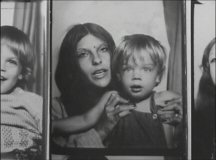Tarnation (Jonathan Caouette, 2003)
 Tarnation, the autobiographical first feature from director Jonathan
Caouette, through digital editing techniques and a bit of perspective, tries to
elevate the home movie to the level of art. Cobbled together from a seemingly
endless supply of personally shot footage, the finished product uses techniques
like dissolves and split screens until the oversaturated, conventionally
“bad” video photography becomes a ghostly virtue. The multitude of video
techniques and low budget feel that’s employed almost makes the experience of
watching it feel like a collective memory, hewn together from the shreds of all
the home movies we’ve relegated to a forgotten closet.
Tarnation, the autobiographical first feature from director Jonathan
Caouette, through digital editing techniques and a bit of perspective, tries to
elevate the home movie to the level of art. Cobbled together from a seemingly
endless supply of personally shot footage, the finished product uses techniques
like dissolves and split screens until the oversaturated, conventionally
“bad” video photography becomes a ghostly virtue. The multitude of video
techniques and low budget feel that’s employed almost makes the experience of
watching it feel like a collective memory, hewn together from the shreds of all
the home movies we’ve relegated to a forgotten closet.
Picking up in March 2002, Tarnation begins as we see Jonathan dealing with news of his
mother’s apparent lithium overdose. One of the first scenes shows Caouette
filming himself with a video camera, even though he has a fever and is clearly
stressed out by mother’s condition. Soon,
it becomes apparent that this kind of exhibitionism is a form of
self-preservation for the director. When he returns home to his mother, his
memories of his Texas upbringing are unleashed, taking the form of an
avant-garde montage of photos and video scraps, organized by a series of
detached, unspoken intertitles that refer to Jonathan in the third person and
recap the tragedies of his formative years, helping to explain the development
of his current personality. Music guides these early flashback sequences, but
they remain a bit inelegant, even if I can’t quite say that I’ve seen this
exact approach used before. Stylistically, the barrage feels akin to watching an
epileptic fit, though the experience becomes more explicitly defined when it’s
made clear that Caouette suffers from a depersonalization disorder
(characterized by the feeling that your own life is a dream – that you’re
“watching yourself live from the outside”).
 The unfortunate details of Caouette’s
childhood pack a collective wallop. The son of Renee, a former child model who
was paralyzed and then subjected to an unending series of shock therapies
(we’re told she’s been in hospitals for treatment over 100 times), Jonathan
clearly has his share of emotional baggage. Footage such as that of Jonathan at
age 11, already admittedly gay, imitating an abused woman while telling a sordid
tale of drug use and physical abuse, is fairly shocking and morbidly
fascinating. Clearly filming himself to provide himself with a therapeutic
outlet, Jonathan’s record of his blistering young psyche recalls the series of
uncomfortably close home movies that dotted last year’s Capturing
the Friedmans. It has to be said, though, that Tarnation, as opposed to Friedmans,
genuinely feels like an extended therapy session (the latter seemed a ghastly
exhibition of pain). Perhaps inevitably, the combined effect of the series of
tragedies we witness makes these scenes feel like a cry for audience sympathy.
When he includes the fact that he had his brain warped by smoking a joint laced
with PCP and formaldehyde or the revelation that he watched as his mother was
raped, it feels like he’s still assigning blame. While no one can deny that
Caouette’s youth was troubled, a compendium of his real-life horrors doesn’t
automatically make for compelling drama.
The unfortunate details of Caouette’s
childhood pack a collective wallop. The son of Renee, a former child model who
was paralyzed and then subjected to an unending series of shock therapies
(we’re told she’s been in hospitals for treatment over 100 times), Jonathan
clearly has his share of emotional baggage. Footage such as that of Jonathan at
age 11, already admittedly gay, imitating an abused woman while telling a sordid
tale of drug use and physical abuse, is fairly shocking and morbidly
fascinating. Clearly filming himself to provide himself with a therapeutic
outlet, Jonathan’s record of his blistering young psyche recalls the series of
uncomfortably close home movies that dotted last year’s Capturing
the Friedmans. It has to be said, though, that Tarnation, as opposed to Friedmans,
genuinely feels like an extended therapy session (the latter seemed a ghastly
exhibition of pain). Perhaps inevitably, the combined effect of the series of
tragedies we witness makes these scenes feel like a cry for audience sympathy.
When he includes the fact that he had his brain warped by smoking a joint laced
with PCP and formaldehyde or the revelation that he watched as his mother was
raped, it feels like he’s still assigning blame. While no one can deny that
Caouette’s youth was troubled, a compendium of his real-life horrors doesn’t
automatically make for compelling drama.
Indeed, it’s much more interesting to
watch Jonathan as he begins to define himself despite his circumstances than it
is to watch as he wallows in his past. The scenes of self-discovery that recount
Jonathan’s first trip to a gay bar (at age 13, disguised as a Goth girl) or
show his budding interest in cinema are perhaps the most emotionally involving
of Tarnation. Watching the moments in which Jonathan films his own
Super 8 exploitation movies (sample title: Spit
and Blood Boys) with the help of his grandma, finds his first boyfriend at
age 15 (you get the sense that he has far more affection for Michael, and later
boyfriend David than he does for his mother), or finally moves to New York City,
one is aware of a kind of hope the belies the movie’s title. For all of the
inherent drama in his story, Jonathan still comes off like a drama queen in the
retelling of it, and that involvement undercuts the stylistic approach’s
approximation of his depersonalization disorder, somewhat. Objective perspective
can’t be (and honestly shouldn’t be) kept here from the people that Caouette
loves or himself, and lack of objectivity amplifies the events of his life,
while the style is trying to remind us just how detached he is.
 Two-thirds of the way through its
runtime, with Caouette firmly established in New York, Tarnation
finally leaves expository stage and begins to gain some momentum as a story.
Jonathan, desperate for answers from his mom and grandfather about their past,
becomes more confrontational. They mostly respond to his questions with
hostility (“We don’t need it on film”, his mother says at one point, while
Jonathan keeps rolling.), but their attitudes seem to suggest most of his
hunches are right. One could complain that Jonathan is perhaps a bit too eager
to demonstrate his personal resilience (does he largely neglect the role played
by social services in his development because they had little effect or because
he had little footage of them?), but after considering his circumstances, it’s
a miracle that he’s not even more unreliable in narrating his own tale. This
is not a film in which concrete resolutions are reached and catharses are easily
attained, and as such it properly reflects at least one truism in our lives.
It’s all the more unfortunate, then, that the final bathroom confessional and
subsequent scene of him tucking in his mother feel like artificial attempts to
provide closure on a life that is still very much in progress.
Two-thirds of the way through its
runtime, with Caouette firmly established in New York, Tarnation
finally leaves expository stage and begins to gain some momentum as a story.
Jonathan, desperate for answers from his mom and grandfather about their past,
becomes more confrontational. They mostly respond to his questions with
hostility (“We don’t need it on film”, his mother says at one point, while
Jonathan keeps rolling.), but their attitudes seem to suggest most of his
hunches are right. One could complain that Jonathan is perhaps a bit too eager
to demonstrate his personal resilience (does he largely neglect the role played
by social services in his development because they had little effect or because
he had little footage of them?), but after considering his circumstances, it’s
a miracle that he’s not even more unreliable in narrating his own tale. This
is not a film in which concrete resolutions are reached and catharses are easily
attained, and as such it properly reflects at least one truism in our lives.
It’s all the more unfortunate, then, that the final bathroom confessional and
subsequent scene of him tucking in his mother feel like artificial attempts to
provide closure on a life that is still very much in progress.
58
Jeremy Heilman
09-27-04